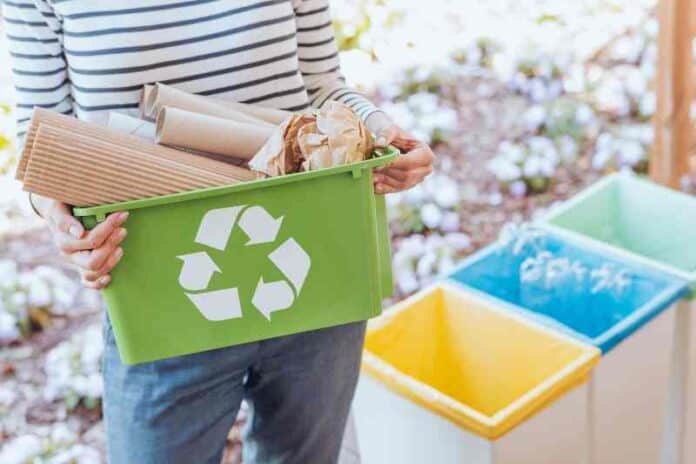
Sweden dumps only 1% of trash in landfills, while China produces the largest plastic packaging waste in the world.
Recycling has become the order of the day for most industries as part of their sustainability practices. However, there are quite a number of people who still don’t understand the benefits recycling brings to the world. Understanding the benefits of recycling more will help you make better waste-handling decisions.
Read along to get seven benefits of recycling waste.
- Recycling Safeguards the Environment
Everyone can agree, one of the greatest benefits of recycling is that it protects the environment against pollution. The whole ecosystem involved in creating new materials and products degrades the environment. Manufacturing new products require extracting raw materials which necessitate mining and logging.
The process of extracting those materials is detrimental to the environmental landscape. Not to mention air and water pollutions as a result of refining and processing the raw materials. Recycling provides the solution to reduce the need to extract and refine new materials.
If manufacturers no longer have to refine raw materials from scratch, greenhouse gas emissions will reduce. This forms the first line of defense against climate change which poses to be a huge problem in the near future.
- Eradicates Pollution
Imagine a scenario where recycling doesn’t exist. Once you use a can of soda, you throw it away, and instead of recycling it, it ends up in a landfill. With over a billion people in the world, within a few years, the world would choke because of the amount of plastic waste.
Because of the environmental damage that waste would cause, a world without recycling is unthinkable. We can therefore agree, recycling has played a huge role in eradicating pollution. Once you’ve finished your soda, you can be certain that the waste can will be reused to avoid polluting the environment.
It’s not like we have another earth where we can throw away all the waste we produce. Without recycling, it would only be a matter of time before our water bodies became polluted with plastics, killing the creatures that live there. The use of PCR packaging is a good recycling program companies should adapt to eradicate pollution.
- Recycling Is Eco-Friendly
What if waste paper was never recycled? If the rate at which we cut trees exceeds the rate at which we plant new ones, it will only be a matter of years before forest cover is reduced to zero. Recycling paper helps protect our forest cover by reducing deforestation.
Paper manufacturing industries no longer have to cut trees to manufacture papers. Recycling has enabled the conservation of trees by reducing the cutting of trees.
- Saves Energy
Recycling eliminates the need to refine and process raw materials from scratch. Making products from recycled materials uses less energy than using new materials.
If industries consume less energy, the burning of fossil fuels to create power will reduce. As a result, the global carbon footprint will also decrease. This is a whole ecosystem of benefits resulting from a noble act of recycling materials.
To put this into perspective, imagine the amount of energy used to refine aluminum used to make cans. If the number of beverage consumption is something to go by, recycling those cans saves a lot of energy. Refining aluminum from scratch will reduce due to recycling of the cans that already exist.
- Tackles Global Warming
Intense climates disasters such as heatwaves, floods, and storms have been on the rise worldwide. Greenhouse gases in the atmosphere have also increased, causing unpredictable weather patterns. Global warming is now a huge threat that calls for immediate action to make the world sustainable.
Recycling is one of the many ways to minimize global warming. It reduces gas emissions such as carbon dioxide, and sulfur which contribute to global warming. This is achieved by reusing materials to manufacture new products causing less emission of gases.
- Reduces Number of Landfills
The world produces about 2.01 billion tonnes of solid waste every year, and 33 percent of that is not managed well. You can imagine the amount of strain on the environment when disposing of solid waste. Recycling such waste products helps reduce the number of landfills which destroy the curb appeal of the environment.
The amount of solid waste increases with population growth. If the waste isn’t recycled, more and more beautiful landscapes will turn to landfills. This affects the health of the people who live near areas with landfills due to emissions of harmful gases.
- Conservation of Natural Resources
Recycling is crucial in conserving natural resources. Instead of exploiting raw materials from the ground, recycling allows waste materials to be reused. This conserves natural resources such as minerals, wood, gas, iron, and water.
Since necessity is the mother of invention, the need to recycle brings about innovative technologies. Many technologies have emerged to enable water recycling for household use. The development of waste management technologies has made reusing waste materials more effective.
Recycle More to Make the Environment Safer and Greener
There is no doubt that recycling is beneficial to the environment in many ways and can help fight global warming. Everyone plays a huge role in ensuring the world is sustainable for future generations by recycling. The above benefits should make you recycle more to safeguard the environment against pollution.
Did you enjoy reading this article? if so, please check out our other Marketing, Business, and Technology blog posts today!

